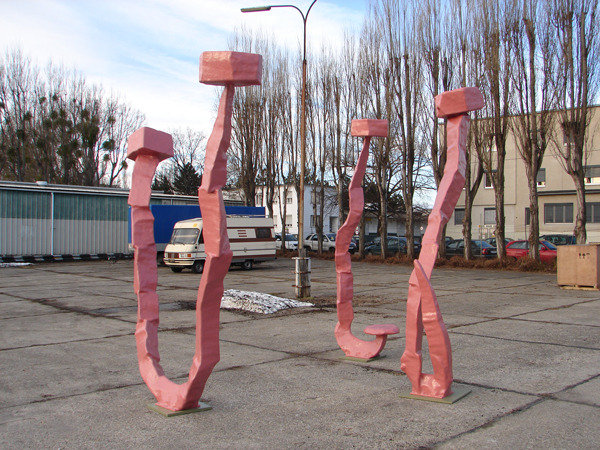Franz West
dal 13/4/2011 al 20/5/2011
Segnalato da
13/4/2011
Franz West
Galerie Eva Presenhuber (maag area), Zurich
Der definierte Raum. The exhibition inaugurates the new space at Diagonal Building. Since the mid 1990s, West has been working on large format external sculptures, initially using iron sheeting later using aluminum.; then he describes his works as "body shapes". Here, unlike most works by the artist, a three-part chair installation shows clear and strictly defined outlines, in the work "Stonehenge" West impressively explores the described mechanisms of communicative and interactive practices.

Galerie Eva Presenhuber is pleased to present new works by Austrian artist Franz West in the exhibition «Der
definierte Raum», which also inaugurates their new space at Diagonal Building.
When, early in his career, Franz West decided to not just work with the two dimensional, but by way of sculpture
rather to allow himself (and others) a world that was to be usable and available to experience in every sense, the
first so-called «adaptives» emerged, sculptural forms that anyone can bring into relation to his or her own body.
With his adaptives, Franz West first formulated a characteristic that would became foundational for his further
work. He did not seek to create as an artist an autonomous and closed validity; instead, the beholder and user
could complete the work with the acts he or she undertakes. Quite in this sense, Franz West once said, «The death
of the author is a theme from the time of Pericles, being a sculptor then meant that ideas flowed through the
individual. They were passive instruments that served to create sculpture.»
As a logical continuation of these ideas, the first furniture pieces emerged, which made it easier for the beholder
to find a way of approaching the works. While they could actually be used as objects in private space, in an
institutional space they took on a puzzling status: are they art or furniture?
The «legitimate sculptures» which emerged after the adaptives deny the beholder any direct physical contact.
These works, which are placed on a plinth or are no longer easy to handle simply because of their size, «do not
want to be understood as objects of a contemplative beholding at rest in themselves, but are in turn primarily
offerings toward a dialog that is now to take place primarily on a conceptual level.»
Since the mid 1990s, Franz West has been working on large format external sculptures, initially using iron
sheeting later using aluminum. For an exhibition at Innsbruck’s Schlosspark Ambras, a whole series of works
emerged that are particularly simple in terms of form: West describes the «Wuste», «Qulze», and «Qwertze» as
«body shapes». Due to their low height, the «Wuste» especially can be seen as an invitation to sit, and thus can be
seen as a link between the adaptives and the furniture. Entirely abstract in form, they can still be subjected to a
standard function.
In the exhibition «Der definierte Raum», Franz West combines works from each of these groups: Here, unlike most
works by the artist, a three-part chair installation shows clear and strictly defined outlines: several West chairs
are placed in a circle, a square, and a triangle. Each of the chairs demands to be used, and thus becomes a
constitutive element of the work. Where the purely elementary forms suggest an almost hopeless situation, the
user is given the possibility of a creative response. Chairs can be moved, new constellations are constantly made
possible.
In the work «Stonehenge», too, Franz West impressively explores the described mechanisms of communicative
and interactive practices.
Two new large format works created for outdoor spaces in 2009 attest to Franz West’s intense engagement with
the philosopher Ludwig Wittgenstein. Already in 1985, West created a model with the Wittgenstein quotation, which
takes a scribble from his «Vorlesungen über Ästhetik» as an example of meaninglessness and randomness,
translating it to three-dimensional space as a «ribbon».
The legibility of these new works is multifarious, they too can be used by the beholder, just like the adaptives, be it
is as a form of seating or as a mind game. In conversation with the philosopher Peter Keicher, he points to a
possible reinterpretation of a quotation from Wittgenstein. Could the idea of whether a statement is then
understood in itself or that a statement only becomes a statement in that it is understood not be applied to the
works of Franz West? In that an adaptive is used as such, or only becomes an adaptive in that it is used?
Franz West, Stonehenge, 2011; Photo: Gerhard Riml
For more information, please contact Björn Alfers b.alfers@presenhuber.com at Galerie Eva Presenhuber.
Opening on Thursday, April 14, 6 – 8pm
Galerie Eva Presenhuber
Diagonal Building, Maag Areal Zahnradstrasse 21, P.O. Box, CH-8040 Zurich
Opening Hours:
Tuesday–Friday 10am – 6pm
Saturday 11am – 5pm or by appointment



